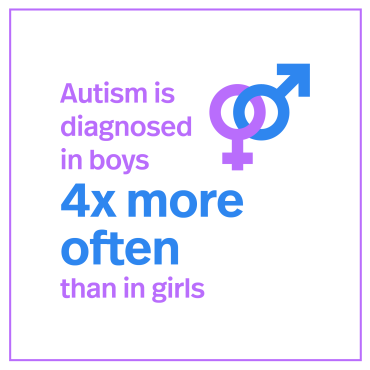Signs of autism in women and girls
Research shows that autism can look different in women and girls than men and boys. According to the DSM-5-TR, the American Psychiatric Association’s most recent diagnostic manual of mental disorders including autism spectrum disorder (ASD), autistic girls and women may present with:
- Better reciprocal conversation skills
- Higher likelihood of sharing interests with others
- Better ability to understand verbal and nonverbal communication
- Better ability to modify their behavior based on the situation
- Less obvious repetitive behaviors
- More socially accepted special interests (like celebrities or animals)
Differences in diagnosis
Because their autism symptoms tend to be more subtle, women and girls without intellectual disability (ID) or language delays often struggle to get an autism diagnosis, receive a diagnosis later in life, or get misdiagnosed. According to the CDC, girls are 4 times less likely to be diagnosed with autism than boys. On average, they also receive a diagnosis almost a year later than boys—at age 5.6 for girls versus 4.8 for boys.
Those who do receive a diagnosis are more likely to have co-occurring ID, epilepsy and anxiety.
Masking in autistic women and girls
Research shows that women and girls are more likely to mask, or hide, their autism symptoms in order to fit in. This often happens when they are in spaces where they do not feel welcome or safe, or where they have not disclosed their diagnosis (like work or school).
Masking can look like:
- Forcing eye contact with others
- Holding back stimming behaviors
- Creating “scripts” for conversations or social situations
- Imitating other people’s facial expressions and gestures
- Hiding special interests
Research shows that masking may be harmful to mental health and well-being, causing anxiety, depression, stress and even suicidality. Masking can also lead to delayed diagnosis, preventing autistic people from getting the support they need until later in life.
I was actually relieved. All of a sudden, I could understand my life and my problems in a very different way, because I understood that my brain works differently.
- Dr. Elisheva Levin, after being diagnosed with autism
Related resources
- Learn more about autism in women and girls
- Dr. Elisheva Levin shares her experience with masking and late diagnosis
- Find local providers and autism services in your area
Contact the Autism Response Team
Autism Speaks’ Autism Response Team can help you with information, resources and opportunities.
- In English: 888-288-4762 | help@autismspeaks.org
- En Español: 888-772-9050 | ayuda@autismspeaks.org

